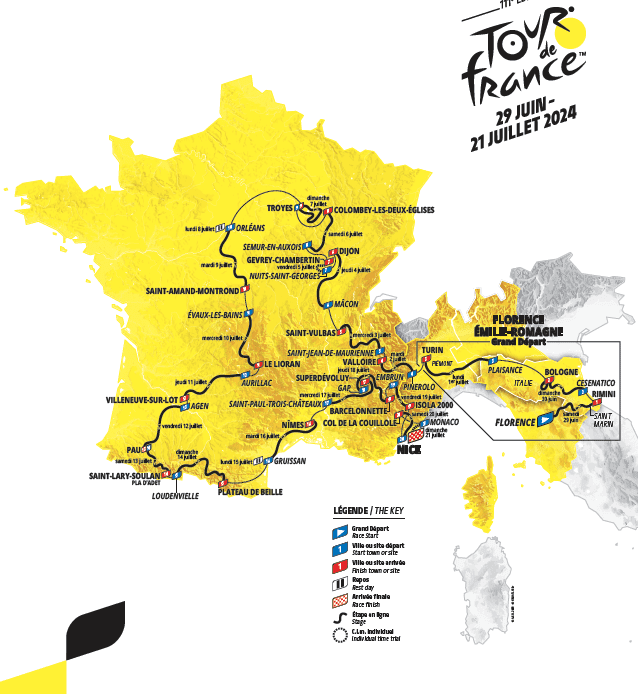After the mountainous 2023 Tour de France route that included just a single 22km time trial, race director Christian Prudhomme unveiled a more balanced but intriguing route for 2024 at the official presentation in the Palais des Congrès in Paris on Wednesday.
The inclusion of two individual time trials for a total of 59km, four mountain-top finishes, a series of gravel sections on stage 9, and a final hilly time trial to Nice will surely create a more open race, with Remco Evenepoel, Primož Roglič and others poised to take on Jonas Vingegaard and Tadej Pogačar next summer.
Race organiser ASO also confirmed they plan to award additional time bonuses of eight, five and two seconds during stages, as well as the usual ten, six and four seconds awarded at stage finishes.
The route of the 2024 Tour de France covers a total of 3,492km with some 52,320 metres of overall elevation. That is 20% more than the 2024 Giro d’Italia and with so many of the climbs coming in the final week, it could make it difficult for Pogačar or anyone else to target a Giro-Tour double in 2024.
ASO claim there are eight flat stages and so eight sprint opportunities but the likes of Mark Cavendish, Jasper Philipsen and their teammates will have to fight hard for each one.
The 111th edition of cycling’s biggest race starts in Florence, Italy on Saturday, June 29 and ends three weeks later in Nice on Sunday, July 21. It is the first time the Tour starts in Italy and the first time it finishes in Nice, to avoid the preparations for the 2024 Paris Olympics Games, which begin just a week later.
Week one: From Italy to the finest French vineyards
The Grand Départ of the 2024 Tour de France will celebrate the history, culture and beauty of central and northern Italy with stages in Tuscany, Emilia Romagna and then Piedmont. The race will also remember the Italian Tour de France winners on the 100th anniversary of Ottavio Bottecchia’s 1924 triumph.
Florence will host the team presentation and stage 1 rolls out from Piazzale Michelangelo, which overlooks the city, before visiting Gino Bartali’s birthplace and the museum that remembers him in Ponte a Ema.
The 205km stage climbs over the Apennines to the Adriatic coast, with 3,800 metres of climbing providing a testing start to the Tour via the Valico Tre Faggi and the Republic of San Marino. The last climb comes just 25km from the finish in Rimini and so could prove too tough…
Click Here to Read the Full Original Article at CyclingNews RSS Feed…

